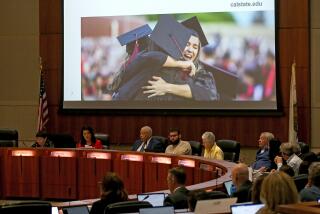Huttenbacks Avoid Prison, Draw Fines
- Share via
SANTA MARIA — Former UC Santa Barbara Chancellor Robert Huttenback, convicted in July of embezzling more than $100,000 of university funds, was spared a prison sentence Wednesday when a judge ordered him to pay a $60,000 fine, serve five years’ probation and perform 1,000 hours of community service.
Santa Barbara Superior Court Judge Zel Canter also ordered the former chancellor’s wife and co-defendant, Freda, to pay a $10,000 fine and spend five years on probation.
Under California law, Robert Huttenback could have been sentenced to seven years in state prison. His wife could have received a five-year term.
Canter said he did not sentence the Huttenbacks to prison because they were first-time offenders, their crime was not violent and they repaid the university much of the money they had taken. And, Canter said, Huttenback’s record at the university contributed to the judge’s decision to impose “alternative sentencing.”
“With Dr. Huttenback, I believe his favorable points greatly outweigh the negative,” Canter said. “You’d have to look at all the factors, including his contributions to the community, which have been tremendous.”
‘Humiliated, Embarrassed’
Huttenback, Canter said, has already been significantly punished. “He’s been humiliated, embarrassed and he’s lost his position. . . . “ But, Canter said, he imposed the $60,000 fine because the crime was one “of avarice, and I’m going to hurt the former chancellor in his pocketbook.”
But Patrick McKinley, a Santa Barbara County assistant district attorney, disputed the judge’s view.
“The shoplifter who steals a wrench from Sears goes to jail,” said McKinley, one of two prosecutors in the case. “The person who steals books from the campus bookstore gets jail time. So how come a guy who steals one-quarter of a million will not be in custody?”
The prosecution had recommended a sentence of four years and eight months for the former chancellor and four years for his wife.
Robert Huttenback’s attorney, Anthony Murray of Los Angeles, said the sentences represented “the first time reason was permitted to enter this case. . . . We’re very happy. It’s an absolute victory.”
Money for His Home
Huttenback, who declined to comment after the sentencing, was found guilty July 15 of embezzling more than $100,000 in university funds and of five counts of income tax evasion in connection with money that was spent on improvements to his home. Huttenback was found innocent of three counts of insurance fraud and two counts of tax evasion linked to the fraud charges.
Freda Huttenback also was found guilty of embezzlement but was acquitted on all other counts.
Huttenback resigned as chancellor in July, 1986, after controversy erupted over his expenditures on the home. At the time, he agreed to repay the university $174,000--a figure UC auditors determined had been misspent.
Huttenback remains a tenured professor of history at the campus. A university spokesman said Chancellor Barbara Uehling will make a decision on his status this week.
Misuse of Funds
The Huttenbacks spent university funds on a number of furnishings for their home and $104,000 to remodel their kitchen. The Huttenbacks also frequently used university employees to work on their home. According to court records, 23 university employees worked more than 4,000 hours on the home. And 10 outside contractors--including plumbers, electricians, painters, locksmiths--also performed services for the Huttenbacks and billed the school.
The prosecution could not determine the exact amount Huttenback embezzled but determined that it was more than $100,000.
An audit conducted last year by the state auditor general concluded that at least $271,240 was “inappropriately spent” to “repair, remodel, improve and maintain” the Huttenbacks’ personal residence.
The Huttenbacks’ probation officer, Melvin Bonner, had recommended that Robert Huttenback serve three years and four months in prison.
In his four-page evaluation of Huttenback, Bonner acknowledged that the former chancellor “had a long and distinguished career as a devoted educator, dedicated historian and productive administrator.”
Interests of Justice
But, Bonner wrote, “the interests of justice consist of more than just an evaluation of the person.”
“As chancellor, he had access to considerable amounts of money in discretionary funds which he chose to abuse in his own self-interest,” Bonner wrote. “Such a violation of trust does not argue for leniency, but rather that the prison term prescribed by law be imposed. Had there been any question as to Dr. Huttenback’s criminal intent, (I) would probably have leaned toward probation. Regrettably, this is not the case.
“His crime was largely motivated by a desire for personal gain and the feeling that he was unlikely to get caught.”
Bonner had recommended that Freda Huttenback be sentenced to serve six months in county jail and provide 500 hours of community service.
“There are those who feel that Freda Huttenback was every bit as involved in the embezzlement of public funds as the ex-chancellor,” Bonner wrote. “The difference between the two . . . (is) the fact that Mrs. Huttenback had no vested authority or given responsibility for her actions.”
Basis of Defense
The Huttenbacks based their trial defense on the contention that they believed the university funds spent on their home were justified because they frequently used the house for entertaining potential university donors and for recruiting faculty.
But the prosecution claimed that Huttenback did not use his home often enough for university business to justify the expenses. And prosecutors contended that he illegally spent the money and kept the expenditures secret to avoid paying taxes on the improvements.
The Huttenbacks were acquitted of insurance fraud and tax evasion charges in connection with an $8,000 payment they received from their insurance company in compensation for antique silverware they reported stolen. Huttenback testified that two months after the payment, their housekeeper found a portion of the silverware and Freda Huttenback informed the insurance company. The Huttenbacks claimed they kept the $8,000 because it only represented a partial payment for the stolen silverware.
As a result of the Huttenback case, the University of California has tightened its internal financial auditing procedures.
More to Read
Sign up for Essential California
The most important California stories and recommendations in your inbox every morning.
You may occasionally receive promotional content from the Los Angeles Times.













